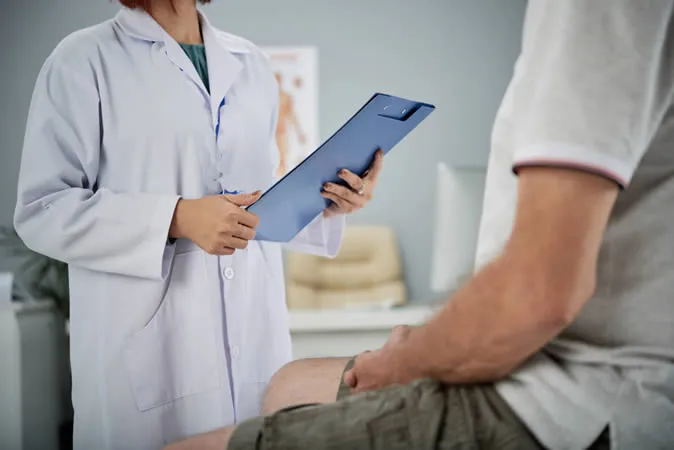What is Herpes Simplex Virus?
Herpes simplex virus (HSV) is a viral infection that can cause cold sores (oral herpes) or genital sores (genital herpes). There are two types of herpes simplex virus: HSV-1 and HSV-2.
HSV-1 is primarily associated with oral herpes and is commonly contracted through contact with infected saliva.
HSV-2 is primarily associated with genital herpes and is typically transmitted through sexual contact.
Both types of herpes simplex virus can be spread from person to person, and once contracted, the virus remains in the body for life, lying dormant until it is reactivated. When reactivated, the virus can cause outbreaks of sores, although many people with herpes do not experience symptoms or only have mild symptoms.
Herpes simplex virus is a highly contagious infection and can be spread even when sores are not present. It’s important to practice safe sex and good hygiene to reduce the risk of transmission.

What are the causes of Herpes simplex virus?
Herpes simplex virus (HSV) is caused by the herpes simplex virus type 1 (HSV-1) or type 2 (HSV-2).
HSV-1 is primarily associated with oral herpes and is commonly contracted through contact with infected saliva, such as through kissing or sharing drinking utensils.
HSV-2 is primarily associated with genital herpes and is typically transmitted through sexual contact, including vaginal, anal, or oral sex.
Once contracted, the virus remains in the body for life, lying dormant until it is reactivated. The exact triggers that cause the virus to reactivate are not fully understood, but stress, illness, hormonal changes, and certain medications can all contribute.
It is important to note that herpes simplex virus is highly contagious and can be spread even when sores are not present.
What are the symptoms of Herpes Simplex Virus?
The symptoms of herpes simplex virus (HSV) can vary depending on whether it is causing oral herpes (cold sores) or genital herpes. Some common symptoms of herpes simplex virus include:
- Cold sores (oral herpes): Painful blisters or sores on the lips, mouth, tongue, or face. These sores may be accompanied by itching, burning, or tingling.
- Genital herpes: Painful blisters or sores on the genital area, anus, thigh, or buttocks. These sores may be accompanied by itching, burning, or tingling.
- Flu-like symptoms: Fever, headache, muscle aches, and fatigue can occur before the appearance of blisters or sores.
- Painful urination: Burning or pain while urinating can occur during outbreaks of genital herpes.
It’s important to note that some people with herpes simplex virus do not experience any symptoms, or only have mild symptoms, but can still spread the virus to others. If you experience symptoms of herpes, it’s important to see a doctor for proper diagnosis and treatment.
What treatments are available for Herpes Simplex Virus?
There is currently no cure for herpes simplex virus (HSV), but there are treatments available to help manage the symptoms and reduce the frequency and severity of outbreaks. Some common treatments for herpes simplex virus include:
- Antiviral medications: Antiviral medications such as acyclovir, valacyclovir, and famciclovir can help reduce the severity and frequency of outbreaks and can also reduce the risk of transmitting the virus to others.
- Topical creams: Topical creams containing numbing agents, such as lidocaine, can help relieve pain and discomfort during outbreaks of genital herpes.
- Pain relievers: Over-the-counter pain relievers such as ibuprofen or acetaminophen can help relieve pain and discomfort during outbreaks.
- Suppressive therapy: For people with frequent outbreaks, suppressive therapy with antiviral medications can help reduce the frequency of outbreaks.
It’s important to consult a dermatologist or healthcare provider for the best treatment options for your individual needs. Early treatment can help reduce the severity and duration of outbreaks.

How to Help Prevent Herpes Simplex Virus?
There are several steps you can take to help reduce the risk of contracting herpes simplex virus (HSV) and to prevent the spread of the virus to others:
- Practice safe sex: Use condoms and practice safe sex to reduce the risk of transmission of genital herpes.
- Avoid close contact: Avoid close contact, such as kissing, with people who have active cold sores.
- Wash your hands: Wash your hands regularly and avoid touching your eyes, mouth, and nose, especially during outbreaks.
- Avoid sharing personal items: Avoid sharing personal items such as towels, razors, and utensils with others to reduce the risk of transmission.
- Avoid close contact with newborns: If you have active cold sores, avoid close contact with newborns and infants.
- Maintain good hygiene: Practice good hygiene and regularly clean and disinfect any surfaces that may have come into contact with the virus to reduce the risk of transmission.
- Use antiviral medications: If you have been diagnosed with herpes simplex virus, using antiviral medications as directed can help reduce the frequency and severity of outbreaks and reduce the risk of transmission to others.
It’s important to remember that herpes simplex virus is highly contagious and can be spread even when sores are not present.
FAQ About Herpes Simplex Virus?
How long does it take for HSV symptoms to appear?
The incubation period for HSV can range from 2 to 12 days after exposure.
How is HSV diagnosed?
A healthcare provider can diagnose HSV through a physical examination, visual inspection, and laboratory testing.
Can HSV cause long-term health problems?
In some cases, HSV can lead to more serious health problems, such as encephalitis or genital ulcers, which can cause long-term physical and emotional distress.
Is there a dermatologist near me in West Palm that offers treatment for Herpes Simplex Virus?
Yes. At our West Palm dermatology office we offer treatment for Herpes Simplex Virus to patients from West Palm and the surrounding area. Contact our office today to schedule an appointment.

